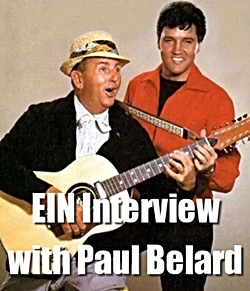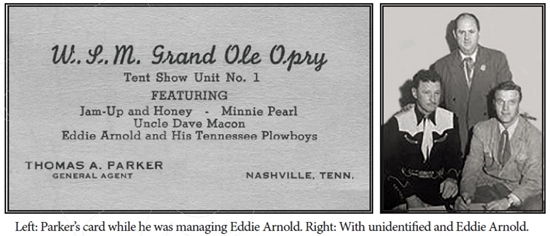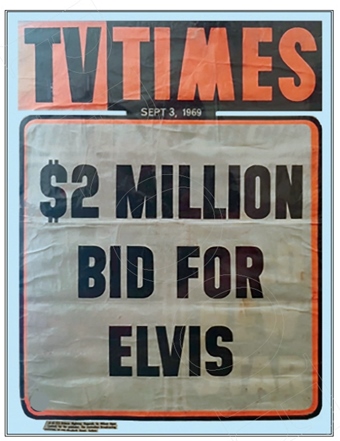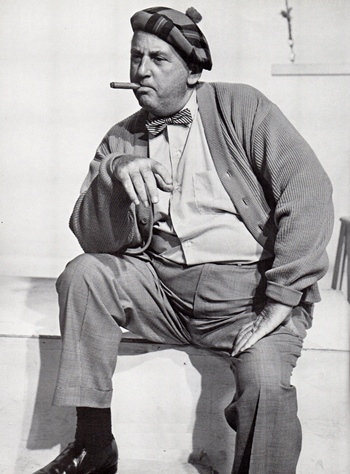There have been more than 20 books published about the relationship between Elvis Presley and his manager, Colonel Tom Parker (originally known as Andreas Cornelius van Kuijk).
The Elvis and the Colonel literary canon is a broad one, ranging from slimline photobooks and tabloid accounts, to volumes based on third-party accounts or documents (Darrin Memmer's trilogy) and scrupulously researched biographies (Alanna Nash's The Colonel)........and everything in-between.
Paul Belard's perspective on the relationship was recently published, The King and the Jester. It follows hot on the heels of another book, Greg McDonald and Marshall Terrill's, Elvis and the Colonel: An Insider's Look at the Most Legendary Partnership in Show Business.
The two books are thematically, diametrically opposed!
McDonald (the "insider") and Terrill's book offers nothing new apart from a few (possibly) not before heard stories of McDonald's time working for the Colonel (and Elvis). It is essentially a "rose colored glasses" account, bereft of addressing any of the thorny issues that surround both Tom Parker's life and his management of the world's biggest superstar.
Belard's book, with its invective prose, is strikingly different. The author makes his disdain for Parker known from the outset and he does not hold back about what he sees as one of, if not the biggest, travesties and examples of unscrupulous mismanagement, in show business history!
To the author's credit he does acknowledge the progressive decisions of Parker in the early years, but any acumen in that thinking dissipated quickly in the 1960s (with only rare and "forced upon" him decisions by the 70s).
While Parker’s rather dubious background is examined in the first chapter, one of the delights in this book is how quickly it does move from ‘Andreas van Kuijk’ to Parker’s involvement in the music field, managing Eddie Arnold, Hank Snow and Jamboree Attractions and then Elvis. It’s a gripping read.
In 1953 Arnold fired Parker via a terse telegram: "Your services are no longer required. From receipt of this wire, consider yourself dismissed."
The book includes plenty of fascinating photos throughout, some that looked new to me, as well as some original letters and telegrams. The ‘Snowmen’s League’ membership letters and photos nowadays seem more psychopathic than actually funny. Was it ever funny for anyone but Parker?
Throughout the book, Belard raises serious questions about Parker’s life and mismanagement of his client. The well-known contracts favoring Parker over Elvis, the numbing effect (on Elvis) of formulaic films, the Colonel’s status as an illegal alien, his jealousy of the adulation Elvis received, the list is a long one.
One of the strong things about Belard's narrative is that he moves beyond the superficial to detail how what transpired stifled, muffled, and strangled Elvis Presley's career!
The author’s account is persuasive, as incident after incident accumulate, and as a whole, form a more than unsettling picture.
Parker's scurrilous approach to management is encapsulated in this passage in the book:
Over coffee and scrambled eggs, he told me a bit about himself ... About the time he bought 900 pairs of binoculars from Army surplus for 90 cents a pair and sold them at a dollar each (10 cent profit) at the back of the auditorium. “They had just plain glass in them, but they looked good”, he admitted.
What does he do during Elvis’ shows? “Well mostly I count the money after I’ve sold the programmes”, he said.
By mid-1956 Elvis Presley was generating huge pay-deals (think The Ed Sullivan Show). Despite this, Parker's "penny pinching" approach to business was on display:
In another telegram, this time to Harry (Kalcheim, William Morris Agency) on March 13, Parker wrote: “Would it be possible if Presley is picked on Talent Scouts that he could go on the show the same night to save extra trip up there.” Good old Parker, never missed a chance to save some money!
While Parker saw an opportunity to rebrand Elvis if he was drafted, others focused on a different issue:
Renowned Memphis journalist, Bill E. Burk, in his book Soldier Boy Elvis, got quickly to a point most others missed, about the colonel’s patriotic invective around Elvis being drafted, with an incisive observation: “That was easy for Parker to say… It would be Elvis sleeping on frozen turf out there on a barren German hilltop; not him. It would be Elvis eating those gosh awful-tasting C-rations out of boxes and cans, while the “Colonel” was back in Hollywood dining at post Chasen’s. It would be Elvis being bounced around in an open-air jeep while the “Colonel” was being chauffeured in flashy limousines.”
The author also provides a wide-ranging account of the offers Elvis received to tour internationally....... Britain, Europe, South America, Japan, Australasia, the pyramids in Egypt, et al.
With offers between $1M and $10M, Parker refused them all! The author acknowledges however that Elvis, if he really wanted to tour overseas, should have asserted himself.
From a monetary point of view Belard neatly points out..
The original 1969 contract for Elvis' appearances at the International Hotel in Las Vegas stipulated that Elvis' salary was $100,000 a week, for four weeks, seven nights a week, two shows per night.
In 1969, one pound was equivalent to about US$2.40 so the offer by ‘Lord Sutch Enterprises’ for two appearances at the Wembley Empire Stadium in England for 1 million pounds was therefore worth about $2,400,000. In comparison, the compensation he got from the International Hotel was pocket change.
If there is something Parker understood very well, it was money. Why then would he scoff at such an offer with his glib "Just put down the deposit" and not offer to begin a contract discussion?
Three chapters “The Lost Years” examine Parker’s failure throughout the sixties to help maintain Elvis’ creative interests or get Elvis a role in any artistically worthy movie. Instead Parker happily explains to a reporter in 1960 about Elvis’ films.. ”They’ll never win any Academy Awards. All they good for is to make money.”
‘Looking at some of the pictures taken of Parker during the movie years, it is difficult not to jump to the conclusion that it was just a big joke to him, albeit it a very rewarding one monetary wise
Quotes from Elvis interviews also demonstrate his frustration with Parker’s movie deals, such as in 1972 where Elvis noted the impact they had on him, emotionally and physically:
- You really cared about the movies, and you cared if they were not good?
Elvis: I cared so much until I became physically ill. I would become violently ill. I'd get a temperature, something happened to me.
The fact that, at a certain stage, I had no say so in it. I did not have final approval of the script, which meant I could not say this is not good for me.
.. I'll be right into production, I was doing a lot of pictures close together, and the pictures got very similar. You know, if something was successful, they tried to recreate it the next time around. So I read the first four or five pages and I knew it was just a different name, twelve new songs in it. The songs were mediocre in most cases, you can't get good songs. So that's what might have made it seem like indifference, you know, but I was never indifferent. I was so concerned until it's all I talked about. It worried me sick, so I had to change, which I did."
Belard also includes two chapters specifically examining how, as a manager, Parker stifled Elvis’ creative musical interests.
Belard’s prose often resonates with a powerfully burnished and awakening quality, one that, as this long and eloquent passage offers, transcends the core purpose of the book to highlight the magic and beauty of the performer:
It is still mind boggling that the single “Spinout / All That I Am”, while not bad (even though it peaked at number 40 in the charts, an all-time low for a movie single) was issued instead of one coupling “Tomorrow Is a Long Time” with, say, the raunchy “Hi Heel Sneakers” or the beautiful “I’ll Remember You”. It would have gone a long way to dispel the rumors that Elvis was not aware of the current music scene.
With the first notes of “Tomorrow Is a Long Time”, one is taken aback by the introduction, the guitars, the bass, the tambourine and Elvis’ humming. The slow tempo, the austere yet striking music, Elvis’ voice almost immediately draws the listener into a spell. Elvis’ daring is overwhelming, his voice filled with anguish vacillating between struggle with “this end-less highway”, and hope when he wishes to “hear his love’s heart pounding.” The suffering is buried in every note of this tale of desperation, its unearthly loneliness very clear, but so too something almost stronger, some sense of an unbending poetic beauty that rises throughout the song. One tries to find the simple meaning of the words, listen to them as though the singer might or might not get another chance, and lets the mind wander into idle speculation upon his fate.
While the undertone of the piece is melancholy, the melody makes it uplifting. As the song comes to an end, it ends as it began, with Elvis’s humming, and nothing resolved. It is music of this world, Dylan’s words expressing suffering, struggle, hope, the inevitability of loneliness and the peace of understanding and acceptance. Elvis’ version is inspired by Odetta’s cover. It is not injected with the raw Mississippi Delta blues as Odetta does. The more subdued instrumentation of Elvis’ version, the meekly but never maudlin vocals lament about what was lost and what could have been, by turns focusing on the singer’s own true love and on the pain and uncertainty it feels, elevate the song to an awe-inspiring level. It has an odd mesmerizing impact on the listener, an almost mystical pull.
The singer’s performance is at times subtle, at times powerful. The paradox of his grief is a resonant landscape of emotions, not unlike a painting layered on this stretch of asphalt with no end, on which his soul is bared as never before. It is nothing but a masterpiece, a polished piece of silver shining brightly among the slag dripping from the current movies.
 |
The later chapters discuss Elvis’ on-stage comeback and how the ‘casino’ deals would keep Parker’s gambling debts afloat while at the same time crushing Elvis with the series of repetitive performances to casino audiences.
The failure to deliver Elvis the stimulation of a ‘World Wide Tour’ is distressing and unlike the rose-coloured fantasy of the recent ‘Elvis and the Colonel: An Insider's Look’ Belard presents plenty of facts and interview quotes to back up his judgment of Parker’s failures.
The lack of managerial wisdom towards his only client becomes frustrating when you know that others could have helped guide Elvis to even greater long-term achievements. As Belard rightly notes...
“Elvis had an unexploited reserve of talent. But he needed guidance in his career, from somebody who could draw out what he did not always know he had. Sam Phillips, Steve Binder, and Chips Moman had done it for him in the studios and on the television set. They were mentors; they passed to Elvis their experience; he learned from them. They influenced his professional growth by offering guidance. Consistent with his psycho-pathological tendencies, Parker was incapable of filling this role.”
The book also looks at Parker’s extraordinary behaviour after Elvis’s death (“This won’t change anything” Parker is reported to have said) and the 1981 Blanchard Tual investigation into the Presley estate mismanagement .
Tual charged the Colonel and RCA with, “collusion, conspiracy, fraud, misrepresentation, bad faith and overreaching.”
He also noted that, “the estates executors and attorneys were ‘afraid of Colonel Parker’, in the same way Elvis and Vernon had been. He was ‘stunned at the hold Parker seemed to have over the very people he had deceived.’
And while we have no doubt the Parker could have obtained a US passport if he wanted, there is the undeniable fact that (despite Todd Slaughter and other Parker devotee denials) Col Parker was indeed an illegible alien. Belard confirms that during the court-case Parker himself argued that “he had never applied for US citizenship, he was therefore a man without country, essentially a stateless person to whom the laws of the United states did not apply.”
Over the 23 chapters Belard’s detailed examination of Parker’s personality, greed and style of management makes sober reading and leaves no doubt that a more empathetic manager would have not only helped keep Elvis happy but possibly have helped him live to an old age.
Some fans have suggested that Baz Luhrmann’s 2022 drama made Parker out to be too much of a cartoon villain but after reading this book the movie looks even more truthful than fans might have believed.
The Appendix even includes a fascinating interview with TV’s nice-guy Dick Clark where in 1993 he finally revealed his true thoughts about Parker and they are quite shocking, including.. “He kept him in a cage like an animal. He trotted him out like a trained bear..”
Throughout the book The King and the Jester features numerous good quality b&w and color photos, and a range of interesting archival material.
Verdict: The King and the Jester is a no-holds barred excoriation of Andreas Cornelius van Kuijk (aka Colonel Tom Parker). Whether Parker was a jester or indeed something worse, Paul Belard offers a cogent analysis of how he took advantage of an over-trusting Elvis Presley and contributed to Elvis' career malaise and indirectly his personal decline. As the author notes in his Preface, the book is about “power, vanity, greed and dishonesty”……..and indeed it is. Elvis deserved better and The King and the Jester is likely to justifiably enrage many readers.
** Conflict of interest note: 'The King and the Jester' was edited by (co-reviewer) Nigel Patterson.
Comment on this review
Copies of 'The King and the Jester' can be ordered directly from the author Paul Bélard at pbelard@hotmail.com or from Amazon here. or Amazon UK here
You can read more about The King and The Jester in our exclusive interview with Paul Belard - see below.
Review by Nigel Patterson / Piers Beagley.
-Copyright EIN March 2024
EIN Website content © Copyright the Elvis Information Network.
|
 |
Paul Belard Interview about Col Parker and Elvis 'The King & The Jester': EIN recently discovered that prolific author Paul Belard is researching a new book about Elvis and Col Parker. Due out in 2024 the book has the provisional title 'The King & The Jester'.
Belard explains... Nearly forty-five years after his death, Elvis Presley remains equally famous and easily recognized around the world. For most of the entirety of his adult life, the man who made all the major decisions of Elvis’ career was Tom Andrew Parker, who, himself, became a celebrity by association. Why is Elvis’ manager so well-known? The author is clearly not the only one who cannot name Sinatra’s manager, nor Johnny Cash’s, the Rolling Stones’, Springsteen’s or Beyoncé’s.
On the positive side, Tom Parker was a hard worker, a gifted promoter, a skillful negotiator, and a keen judge of character. Aside from the gifted promoter, which he undoubtedly was, the other traits, put in the wrong hands, can easily become negative qualities....
A new book on Col Parker? EIN wanted to know more about how Paul Belard chooses his topics, his views on wily old Col Parker - as well as the recent 'ELVIS' and 'Priscilla' movies...
EIN's Piers Beagley asked the questions...
(Interviews, Source;ElvisInformationNetwork) |
 |
(Book Review) Elvis The King of the Rings Volume 2 (Paul Bélard): The second volume of Paul Bélard’s two volume photo-journal record of Elvis’ love of rings has been released.
While on holiday, EIN’s Nigel Patterson spent a leisurely afternoon perusing the rich narrative detail and jaw dropping, visual splendor on offer....
... They say first impressions last! The cover image of Elvis’ famous TCB ring is truly striking and sets the tone for what is an impressive examination of another 100+ rings that Elvis owned during his lifetime.
This is more than a photo-book and while the mostly colour images dominate, the narrative component contains valuable and interesting information...
This is Nigel’s detailed review- including nine stunning images from the book
(Book Review, Source: ElvisInformationNetwork) |
|
(Book Review) 'Don't Be Cruel, Elvis: The Bill Black Story': It is easy to forget that, in the beginning, Elvis was only one part of a trio put together by Sam Phillips, which included Bill Black on bass and Scotty Moore on lead guitar.
The unique sound that emerged from their early sessions was the result of a close collaboration of like-minded musicians and an engineer who wanted to generate something as yet unheard.
Bill Black's contribution to Elvis’ success went beyond the bass playing. His antics on stage — twirling his bass, riding it as if it was a bronco to be tamed, trading corny jokes with Elvis — delighted the audiences. Scotty confirmed that, “If it hadn’t been for Bill, we would have bombed many times in the early days.”
Memphis Mansion’s Henrik Knudsen fortuitously befriended Bill Black's family and was entrusted with the family’s treasured scrapbook.
Using this key source, plus the investigative power of author Paul Belard, key rock'n'roll bassman Bill Black finally gets the biography he deserves with this impressive 260 page book.
Packed full of rare photos, great stories and interviews, EIN's Piers Beagley spent some quality time enjoying this very fine tribute to "Blackie" a great musician and a true character ... go here to find out more..
(Book Review, Source;ElvisInformationNetwork) |
 |
Book Review: 'Elvis The King of the Rings Vol 1': Author-researcher Paul Belard's new book doesn’t cover a specific period of time, it covers a “shiny” part of our man's life, his love for big and glittery jewelry, specifically rings.
Elvis liked expensive things: cars, motorcycles, clothes, and jewelry. His jewels befitted a king. He wore sumptuous pendants hung on heavy gold chains; huge lavish rings dripping of rubies, sapphires, lapis lazuli, and emeralds; bracelets of gold and precious gems.
The singer Robert Goulet described Elvis’ penchant for generosity: “I remember once we sat together backstage for two hours. And he was a charming, delightful man. And at one point I said, “That’s a beautiful ring you have there.” He said, “You like it?” I said, “It’s beautiful!” He took it off his hand and put it on mine. He gave me his ring.”
Belard's new book features 254 pages dedicated to Elvis’ love of rings.
The photos include close-ups of so much glorious "Bling" along with stories of Elvis wearing them on-stage and even where they ended up.
Go here to read our review by Kees Mouwen and Nigel Patterson
(Book Review, Source:DayByDay/ElvisInformationNetwork)
|
 |
















